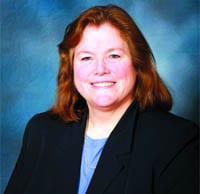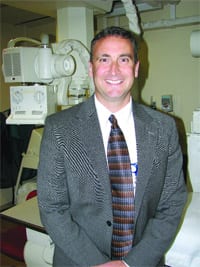Two Baystate Physicians Finalists For Compassionate Care Award
SPRINGFIELD – Two Baystate Medical Center caregivers were honored as finalists on Oct. 28, as part of the prestigious Compassionate Caregiver of the Year Award, given by the Kenneth B. Schwartz Center.
Dr. Maura Brennan, director of the Geriatric Consultation Program at Baystate Medical Center, and Marlene Quinlan, an oncology social worker in the hospital’s D’Amour Center for Cancer Care, were honored during ceremonies held at the Westin Copley Place in Boston that were attended by more than 1,400 health care executives, caregivers, community leaders, and supporters.
The annual award, funded by a contribution from AstraZeneca, recognizes the caregiver in Massachusetts who best represents the goals and mission of the Schwartz Center to “advance compassionate health care in which caregivers, patients and their families relate to one another in a way that provides hope to the patient, support to caregivers, and sustenance to the healing process.”
“My approach to the relationship between caregivers and patients is simply to try to see each person as a whole and to strive to connect with him or her in human as well as professional terms,”
said Brennan. “I try to care for patients the same way I would wish others to care for those I love. It is truly an honor to be recognized by an organization I have worked closely with and which I greatly respect.”
In nominating Brennan for the Schwartz Center award, Susan Mahoney, LICSW, lead social worker, Patient Care Services at Baystate Medical Center, said Brennan “understands that the art of helping loved ones say good-bye is as important as the medications needed to help manage their care.”
At Baystate Medical Center, Brennan founded and directed the nation’s first geriatric medicine track for house officers in an internal medicine residency program and initiated the geriatric evaluation team to improve outcomes and care for elders. Brennan, along with Drs. David Ling and Martin Broder of Baystate Medical Center, recently worked with the Schwartz Center to establish Schwartz Center Rounds, a multi-disciplinary forum for caregivers to discuss difficult emotional and social issues that arise in caring for patients.
The daughter of one of Brennan’s patients remembers her as a doctor who showed extraordinary compassion to her family, saying: “When people die at an advanced age, it’s not considered a great tragedy, but it’s always a great loss. Brennan doesn’t lose sight of this in her dealings with geriatric patients and their families.”
Quinlan’s underlying approach to patient care has always been to provide a sincere and compassionate presence. “The foundation of my practice is unconditional positive regard,” she said. “I listen with my heart, feel with the patient, empathize, and do all of these things in the context of total acceptance.”
Quinlan offers cancer patients counseling throughout their entire cancer experience. Using hypnosis when requested, she helps patients to improve self-worth and self-image, relax, break a negative thought pattern, and regain a sense of control. Her use of clinical hypnosis is quite unique and is praised by many of her patients.
“Marlene has a rare gift of finding serenity amongst chaos and lending a calming voice to those in emotional turmoil,” said Dr. Grace Makari-Judson, medical director at Baystate’s Comprehensive Breast Cancer.
The spouse of one of Quinlan’s patients said that many caregivers overlook the mental and spiritual needs of patients or look to pharmaceuticals to alleviate the pain they feel. “The medical care system has become very technical and impersonal, frequently focusing on treatment plans as though human beings were pieces of machinery needing to be fixed … Marlene focuses on the human side of medical treatment and our universal kinship as human beings.”
The Schwartz Center, established in 1995, is an autonomous, not-for-profit organization, which supports compassionate health care and seeks to strengthen the relationship between patients and caregivers. The Center achieves its goals through education, training, support, and public education. A statewide review committee composed of physicians, nurses, social workers, community health workers, and patient advocates reviewed the nominations for the award.


